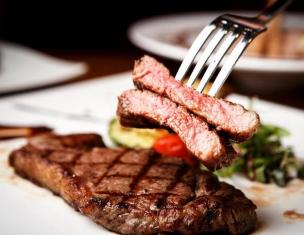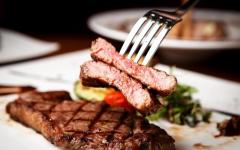Black eggs in China are also called “hundred-year-old”. In Chinese皮蛋 — phi dan. They were called that because appearance and because they can be stored for quite a long time. These eggs are also called “imperial”. In a word, it is a delicacy and one of the favorite snacks among the Chinese.
History of the dish
It is said that somewhere in Hunan province, six hundred years ago (during the Ming Empire), a Chinese man found eggs in the slaked lime that was used a few months ago to build his house. He dared to try them and, as you can imagine, he liked it... He decided to cook it for himself in the same way, but at the same time added salt for taste - and this is how this fabulous dish was born. Then, due to the scale Chinese culture, black eggs were popularized in other Asian countries.
There are traditional and modern methods of preparing the delicacy
Traditional
For this appetizer, duck or chicken eggs are used, much less often quail eggs. Traditional way They are still preparing it, modern ones are used so as not to have to mess around for a long time. If you are an old-school person or just want your egg to be preserved longer, then first make some kind of paste. Take it hot water, pour tea into it, add clay and ash of burnt oak, sea salt, calcium oxide, mix, wait until it thickens, sculpt it all onto the egg, and then roll it in rice husks and straw - this is done so that the eggs do not stick to each other. All manipulations should be done manually while wearing gloves, as you can get a chemical burn. Then you put all this stuff in baskets and bury it in the ground. This entire process may take about a month or two. Have you already run to look for ingredients?) If not, let’s turn to the second method.
Modern
This method is that raw eggs soaked in various chemicals (in a solution of table salt, calcium hydroxide and sodium carbonate, for example), left for ten days, then coated with clay and wrapped in film, kept for several more weeks. It doesn’t matter whether you buried your egg, put it in a jar, or simply wrapped it in film - the main thing is that no air gets in. You leave the eggs alone for a while and let them bathe in this alkaline environment as much as they can. Through the pores in the shell, everything will reach the address and they will take on the proper consistency.
The Chinese have come up with a thousand and one ways to interpret and prepare a “hundred-year-old” egg, the ingredients vary, but, I repeat, the essence remains the same - let it remain in an alkaline environment and in no case allow air to penetrate.
Why do the Chinese still not want to eat fried or boiled eggs?
Because for the Chinese, eggs are, first of all, not something that is tasty, but something that is healthy. Wang Shi Siong wrote in his book that canned eggs have a variety of flavors, help with hangovers, diarrhea, and can even give strength. In Chinese medicine, black eggs are actively used for eye pain, tinnitus, toothache, and they also reduce high pressure and relieve dizziness. It is believed that they are best stored in a cool, dry place.
It should be borne in mind that the amount of lead oxide in some of the eggs can simply go off scale and this is devastating ordinary people in shock.The oxide significantly speeds up the cooking process, which is why unscrupulous manufacturers often indulge in it.
Smart Chinese have also adapted to this - a method for preparing lead-free snacks has been developed so that people who actively consume canned eggs do not ruin their health. Instead of lead, zinc is used, although it is also not particularly useful. Eggs have an ammonia smell due to decomposed amino acids and other chemical reactions, so when you eat eggs, it is recommended to add a little vinegar to reduce the amount of alkaline substances and give the egg a more pleasant smell and taste.
Plus, these eggs are really cool and have their own special twist. Centennial eggs are also called松花蛋 son hua dan.
What does this mean and why was it called that?
And not just like that! 松花 song hua - pine flowers, and蛋 dan – egg. The result is eggs that have a pattern in the form of pine needles. Due to the fact that the egg is left for a long time, some proteins break down into amino acids, and amino acids, in turn, can interact with both alkaline and acidic substances. Thus, people deliberately add some alkaline substances such as lime, potassium carbonate and sodium carbonate. They pass through the pores in the eggshell, combine with amino acids and form amino acid salts. They are insoluble in proteins and crystallize into a certain geometric shape - beautiful pine patterns. The clearer the pattern, the better egg by quality. In general, don’t bother!))

What does this black egg taste like?
This delicacy of Chinese cuisine did not pass me by either - I tried it. And I can’t say anything bad about him. The taste is really specific, I ate it with my eyes closed, because I’m an average foreigner, I’m fooled by beautiful pictures“sushi and pizza”, and therefore expected the worst from this curiosity. But it didn't taste as bad as it looked. The white resembles a hard jellied meat with a taste of chemicals or some strange medicine, and the yolk is like a yolk, but its structure can be a little liquid and have a certain creamy taste, no matter how strange it may sound. But personally, I repeat, this dish reminded me of salty jellied meat with a chemical taste and something slightly runny inside. In a word - you can eat.
Maybe these eggs are not for everyone, but I definitely can’t call them “disgusting”. I can only be surprised at how the Chinese thought of preparing it so intricately. In Ukraine, we simply paint eggs and that’s it, we call them pysanka – we don’t bury them in the ground. But the Chinese black egg is also original and unusual, for example, the same patterns on the white. Where else will you see this?
To summarize, I want to say that each person has his own taste preferences and receptors, so this egg may remind you of something different and you will not agree with me. Some people find it sharp, for example. Share your opinion with us and never be afraid to try something new. After all, black eggs are the same eggs, only in profile.
Duojiao Pidan, or "Century Eggs" with Duojiao, is a traditional Hunan cold appetizer. It is believed that the best time to enjoy this snack is summer. About Duojiao seasoning We already told you once. Duojiao Pidan is famous primarily for another main ingredient - Pidan eggs, or " Centenary eggs ».
“Century eggs” is a ready-to-use product; you can eat it simply by cutting it into slices and serving it with light soy or oyster sauce, or you can prepare an appetizer or salad from it. Dishes made from “hundred-year-old eggs” are consumed immediately and are not prepared in reserve. Unpeeled eggs should be stored in the refrigerator. If the shell is cracked, this is a sign that the egg is about to spoil.
Residents of the Middle Kingdom are proud of their beautiful and sophisticated cuisine with rich history and traditions. " Centennial eggs", as part of the culinary heritage of the Chinese, are popular not only in their homeland, but also in Vietnamese and Thai cuisines. But Europeans have at least two prejudices regarding this unusual Chinese delicacy. The first thing that repels Europeans is the very appearance of the eggs - the white, which has become elastic, brown and translucent, and the yolk, creamy and greenish in color. And secondly, the Chinese, who treat guests to this appetizer as the pride of their national cuisine, tell how such eggs are prepared. Europeans understand by the appearance and method of preparing these eggs that in their homeland such eggs are called “rotten”. And then the “insight” comes - the cunning Asians want to laugh and feed them stale eggs, which probably smell terrible! Not everyone dares to try them. Those who were able to overcome themselves will be faced with two interesting moments at once - the first is that the eggs do not have the smell that the taster was frightened by, and the second is the taste of the eggs. The thing is, they taste almost like regular ones. boiled eggs. And here the brave taster is slightly surprised and even disappointed. Strange looking eggs, so intricately prepared, they taste like boiled eggs.
People in the Celestial Empire love to eat well and tasty, and they also love to supply their culinary masterpieces with legends. So the “hundred-year-old eggs” have their own legend. It is believed that this delicacy of national Chinese cuisine appeared during the Ming Dynasty (1368-1644). According to one option, the birthplace of the “hundred-year-old eggs” is the city of Wujiang (Chinese: 吴江, pinyin Wujiang), which is in the southeast of Suzhou County (Chinese: 苏州, pinyin Suzhou) in Jiangsu Province (Chinese: 江苏, pinyin Suzhou). According to the second, this is the city of Yiyang (Chinese: 益阳, pinyin Yiyang) in Hunan Province (Chinese: 湖南, pinyin Hunan). Be that as it may, the legend says that at one small family hotel there was an equally small restaurant, or even a tea room. The owner of the establishment himself was in charge there. He and his wife had no employees, and they had to do everything themselves. The owner had several ducks, and they liked to lay eggs in a pile of garbage in the backyard. The owner knew about this “habit” of birds and looked for eggs in that very place every time. He poured the drunk tea into the trash heap. There was also a pile of ash from the stove. Rice husks were also thrown there. The soil in the yard was clayey. The ducks dug holes in this debris and laid eggs. The weather changed, sometimes it rained. Well, since the owner did not always find duck “stash”, he came across some eggs after some time. And then one day the owner found several eggs covered with clay mixed with ash, rice husks and tea leaves. And when he peeled the egg, the first thing he saw was the darkened white, and there was a pattern on it, like frost on frozen windows. Having tried the eggs out of curiosity, he discovered that they had not spoiled, but were quite edible.
In modern China, there are two ways to prepare such eggs. The first is the old one, in which eggs are coated with a mixture of clay, lime, ash, salt, tea and rice husks. After this, the eggs are placed in baskets and buried in the ground. And left for a period of several weeks to several months, depending on the desired protein density. The essence of this method is to expose the egg to a highly alkaline environment without access to oxygen. At the same time, the pH level rises to 9-12. There is another, modern, way. The egg is soaked for 10 days in a solution of salt, calcium hydroxide (slaked lime) and sodium carbonate (soda ash or laundry soda). Then wrapped in plastic film and left for the same period as the traditional method for aging and hardening the protein. In both cases the result is the same. Perhaps in the first case the eggs are in husks, and in the second they are clean.
 INGREDIENTS:
INGREDIENTS:
Pidan eggs (“centenary eggs”)
- 2 pcs.,
garlic - 2 cloves,
light soy sauce
- 1 tbsp,
black rice vinegar
- ½ tbsp,
Duojiao seasoning (pickled chili peppers)
- 2 tbsp.,
green onion - 1 arrow,
peanut butter - 1 tbsp. (peanut oil is preferred, but any other vegetable oil is fine).

Peel the eggs from their shells (“hundred-year-old eggs” are difficult to clean, so don’t rush and pick off a large piece of the shell at once, like from a hard-boiled egg, but break it off in small pieces, having previously knocked the shell until it cracks) and let them sit in the air for about 30 minutes. , during this time the “aroma”, unusual for the Russian sense of smell, will disappear. I won’t say that it literally kills flies, I would say that this is an exaggeration of people who have never tried these eggs. Peeled eggs emit a subtle ammonia smell, of course, it will be more noticeable if you bring them right under your nose.
Cut the peeled eggs into slices, say, into 8 pieces.
Rinse the green onion and peel the garlic clove.
Finely chop the garlic, and cut the green onion (separate and remove the white part) into rings.


This culinary Chinese egg dish has many names: imperial eggs, Chinese black eggs, hundred-day-old eggs, hundred-year-old eggs - among foreign tourists they are known as “Rotten Eggs”.
The Chinese culinary dish made from eggs does not look very presentable when peeled.
The correct name in Russian is sunhuadan. Directly translated from Chinese, “songhua” means “pine flowers” (“dan” - “eggs”), because after peeling, they, hardened and translucent, reveal mesh patterns reminiscent of pine needles. The richer the pattern, the higher the quality of the eggs. And even in displaying patterns on rotten material, the Chinese were able to use the quality of the dish as an additional factor.
In cooking, only duck eggs are used to prepare real Songhuadan. By folk recipe they are soaked in a mixture of quicklime, salt and water. Duck eggs are stored for a couple of months in clay, salt and sand until the whites turn into jelly and the yolks turn dark green. Usually served with noodles and rice. 
In the modern recipe, the eggs are left to cook for 40-60 days in a liquid consisting of caustic soda, salt and tea leaves.
There are many recipes for how to “kill” eggs. But the essence is the same - songhuadan.
Some foreigners are reluctant to try this wonderful Chinese dish.
There are ready-made canned eggs on sale. The eggs are soft, smooth, but at the same time elastic, the yolk is dark and gelatinous. Due to the sodium hydroxide and ammonia released by the eggs during the cooking process, songhuadan may have a slight alkaline odor and a viscous taste.
A small amount of a mixture of vinegar, ground ginger root and soy sauce will help slightly soften the odors and improve the taste of the dish. Traditional recipe for “imperial eggs”.
The eggs are coated with a three-centimeter layer of a thick paste of mulberry ash mixed with tea infusion with lime, soda and salt, rolled in rice husks and kept in large tightly closed vats or in the ground for exactly 100 days. After this treatment, they do not deteriorate at ordinary room temperature for several years. The yolk becomes dark green and the white becomes amber. Their taste also becomes quite specific - very piquant, slightly similar to baked cheese.
Another recipe for making “hundred-year-old eggs.”
A thick mass is prepared from the ash of mulberry trees, pea stalks, raw lime, baking soda, salt and the juice of tea leaves. This mixture is coated with a 2-3 cm layer of washed duck eggs. Then the eggs are rolled in rice husks, placed in a vat, tightly closed with a lid and stored for 80-100 days. Hence the name - “centennial”. Canned eggs can be stored for several years if the integrity of the coating and shell is not damaged.
Sunhuadan - imperial eggs.
Coat raw eggs with a mixture of earth, salt, lime and soy sauce and bury them in the ground. After 60 days, dig up and make sure that the yolk has turned dark green and the white has turned black and transparent. Now you can serve it to the table.
Canned eggs are a decoration of the Chinese table. Fresh duck and chicken eggs are placed in a clay vat on wheat straw and cover with bamboo dust. Then a decoction is made from soda, tea, salt, pine needles, which is mixed with clay, ash and lime. The cooled broth is poured into the eggs and kept warm for more than a month.
For the Chinese, this dish is a delicacy, just as blue cheese is for the French. Foreigners sometimes consider these eggs to be rotten, but this tasty, nutritious dish with blue-black whites is one of the delicacies of Chinese cuisine.
In a good way, the eggs should be duck, but if there are no Chinese nearby, slightly adjust the recipe and prepare a dish from quail or chicken eggs won't offend anyone.
But I still haven’t had the desire to try such exotic eggs, although I really love various delicacies. I haven’t been to China yet, but even if I do, I won’t be able to “overcome” my traditional culinary preferences.
There is an equally strange dish in Chinese cuisine - Bird's Nest Soup.
As soon as I got a room in Shenzhen, I went to explore the store for some products – some familiar and some not so familiar. There were a lot of strange things in the supermarket and it was not at all clear what was inside the boxes and packages with hieroglyphs and completely meaningless pictures. Having already collected a bunch of oddities (half of which I threw out as soon as I tried them), I got to the rows with eggs. ABOUT! Breakfast! I'll take it!
Next to the completely Soviet white eggs and, probably, chicken eggs, there were these slightly bluish-greenish ones with a spot and a label that said in Koryak English that these were duck eggs. After reading this, I remembered that I once ate duck eggs. But that was so long ago that it’s no longer true. I took duck ones to remember what they are.
In the morning, put a frying pan on the stove, put some oil on the frying pan... I took out a couple of eggs, fearing Chinese unsanitary conditions, and just in case I washed them with soap... The frying pan had already warmed up by this time, so taking a knife, I hit the shell of the first egg.
And something went wrong...
It didn't break.
Having picked the shell, an interesting thing became noticeable: the egg inside was black and dense, like a boiled one. My knowledge of zoology did not include knowledge of how strange it was for duck eggs, so I sniffed it, tried a tiny piece, didn’t understand anything and decided to put it off until better times.
At work I asked our Chinese (teaching assistants) what it was. They didn’t really explain anything to me, but they said that you can crumble it into rice after boiling it first.
Which is what I did when I got home. More precisely, I boiled them and cleaned them for cutting and crumbling into rice. The egg looked like this (the photo this time is not mine, well, I didn’t guess... So I’m taking masterpieces from some Chinese sites):
I cut it and smelled it. When cut, they are not so beautiful, but they are also very unusual...

The egg smelled strongly of ammonia. And then I remembered. I read somewhere about strange foods from all over the world. And it was about pickled Chinese eggs, which are typical specifically for Guangdong province, where I lived. Some call them hundred-year eggs, and some call them thousand-year eggs. According to the Internet, it turned out that first they prepare a mixture of lime, ash and horse urine (however, not all sites referred to urine), coat the eggs with it and leave it for 100 days. Here.
But there was also something about being sure to try them in one of the Chinese restaurants, so buying them in the nearest supermarket was a surprise for me.
Well, ammonia was pouring out very strongly, but why not try! So I bit. She honestly chewed and swallowed. The rest was thrown into the trash. The taste for me came down to one single association that arose in the brain - caustic.
However, the pleasure is dubious, but these eggs look very cool. When leaving China, I came up with some entertainment: I bought a couple of them and began treating my Russian friends in Thailand (by the way, I later saw them in stores here too. In Thailand they are in shells, painted in pink color) + an Italian friend of mine came to Malaysia... My friends’ delight, of course, knew no bounds - they say, wasn’t there anything nicer to bring as a gift?? But we tried everything honestly. However, no one was impressed enough to eat the whole egg.
Recently, the American television company CNN, with the help of its so-called citizen correspondents, compiled a list of the most disgusting dishes in the world. The main terrible delicacy was called “hundred-year-old eggs” - a traditional dish Chinese cuisine. A few days later, the Chinese themselves reacted to CNN's insolence - they were offended by the television company, accused its employees of ignorance and demanded an apology.
The “hundred-year egg” or as it is also called the “thousand-year egg” is a Chinese delicacy. This is a black artificially aged egg that never spoils.
Let's find out how it turns out this way...

The eggs are covered with rice husks, clay, salt and ash. The eggshells protect them from these elements and germs for several months while they are buried. Eggs have a different consistency than their fresh counterparts. The white turns into a creamy brown jelly, and the yolk turns into a black powdery substance. Consumption of “centenary eggs” is believed to cure high blood pressure and relieve poor appetite. Historically they are made from duck eggs, but goose, chicken, turkey and quail eggs can be used as alternatives.

The modern cooking method may differ from the traditional one. New methods involve soaking eggs in a very strong alkaline solution. To soften the yolk of “centenary eggs,” zinc or lead oxide is sometimes added. The main catalyst for the physicochemical changes that occur in buried eggs is sodium hydroxide, which forms in the paste or solution covering the eggs. This alkali causes changes in the color and consistency of the egg components.

"Century eggs" have an odor that is reminiscent of some cleaning products. Hydrogen sulfide and ammonia, which are produced during the fermentation process, give the eggs their distinctive signature. Eggs can be used as a side dish or served separately. They are most often eaten with tofu or with congee and pork. Since some cooking methods involve the use of lead oxide, there is a possibility that lead oxide may be present in the product. You don’t have to visit China to try “hundred-year-old eggs.” Most Asian grocery stores outside the region carry this delicacy.

Traditions national cuisines sometimes they are quite ambiguous: in some places it is considered common practice to eat fried guinea pig for lunch, in others they prefer duck blood soup, and in some places they serve unsightly colored eggs that have lain in the ground for a couple of months. And nothing - people eat. True, for some who are accustomed, for example, to eating cheeseburgers with cola, this approach to the diet seems, to put it mildly, strange.
This is understandable - gastronomic traditions are formed over centuries in a certain territory, and traveling far beyond its borders is often dangerous and unpleasant. Even today, for example, not everyone copes with natural disgust, which, when introduced to exotic food, acts as a kind of insurance against an accident - it would not be very polite on the part of a newcomer if he suddenly vomited on the hospitable table of foreign friends.

To try “hundred-year-old eggs,” which look like some kind of alien jelly, you don’t have to go to a remote Chinese village. You can just go to the supermarket and buy a package of these ugly eggs, but obviously loved by the Chinese. There are several companies involved in the production of such products, but the largest of them is currently Shendan, whose employees apparently read CNN Go from time to time.

It is difficult to explain otherwise what happened literally a week after the publication of the list of disgusting food. And this is what happened: on July 6, the chairman of the board of directors of Shendan and three thousand of his subordinates sent a complaint to CNN, in which they demanded an apology for assigning the title of the most disgusting food in the world to “hundred-year-old eggs.”
The document states, among other things, that employees of an American television company made completely unfounded and unscientific conclusions about the taste of the famous Chinese snack. And this circumstance indicates that the authors of the note about national dishes showed disrespect for foreign culture, and also demonstrated their ignorance and arrogance.

On the one hand, the comrades from the Shendan egg company can understand who would like it if your favorite food is called an utter disgusting thing that cannot be eaten without tears in your eyes and the urge to vomit. But on the other hand, if you look at the situation a little differently, you can come to simple and obvious conclusions.
The private opinion of a person who bought for the sake of culinary experiment unusual food. Even if, before taking a sample from the “hundred-year-old eggs,” the author of the note about them had armed himself to the teeth with all sorts of theoretical calculations about the history of the origin of the recipe and the benefits of the product, he would hardly have been able to contrast this knowledge with the reaction of his taste buds.

After all, a CNN citizen correspondent described the experience honestly, and these raw emotions of a typical Westerner give more insight into the taste of an Eastern product than the phrase “traditional, healthy dish with a rich history." After all, readers are waiting for an assessment, and not for what they themselves are able to read in a culinary encyclopedia.
In a word, before starting to write an angry complaint, the Chinese company should not have forgotten that there are indeed many quite unique and strange dishes in the world and their popularity directly depends on the culinary preferences of not only different nationalities in general, but also individual people in particular (especially Moreover, some Chinese residents speak about the simplest and most familiar cheese to most Westerners in much the same way as the author of a short article in CNN Go about “hundred-year-old eggs”).
It is possible that among the readers of this text there will be one fearless fan of “hundred-year-old eggs” who orders them for crazy money directly from China and at the same time cannot stand fried potatoes, calling them nothing less than the most disgusting food in the world. So one might not pay any attention to someone’s “fu” to a large producer of egg products.
This is what other producers of those unusual dishes that appeared on CNN's list have done (at least for now). In particular, Philippine woodworm larvae in a sauce of vinegar, salt and lime are next in the ranking after the “hundred-year-old eggs.” Until it occurred to the Filipinos to write a letter to CNN with a complaint along the lines of “I don’t consider your stupid hot dog to be food.”

There were no angry letters from those who specialize in the production of fermented soy chips (Indonesia), dog meat and tripe products (South Korea), fried spiders (Cambodia), fried cicadas (Thailand) and fried frogs (Philippines again). Because, probably, all these people have no time - they are busy with their own affairs, and the crazy foreigners driving around different countries and making big eyes at the sight of locusts in sweet sauce, there is no command for them.
And rightly so. Conflicts in which key point taste comes out, are doomed to failure in advance. In the end, such clashes of opinions are about the same as a dispute about the beauty of a particular shade of color. Everyone will still have their own opinion. And instead of quarreling over some nonsense, it’s better to make yourself a huge sandwich with delicious cheese, or no less tasty - it depends on who you like.










